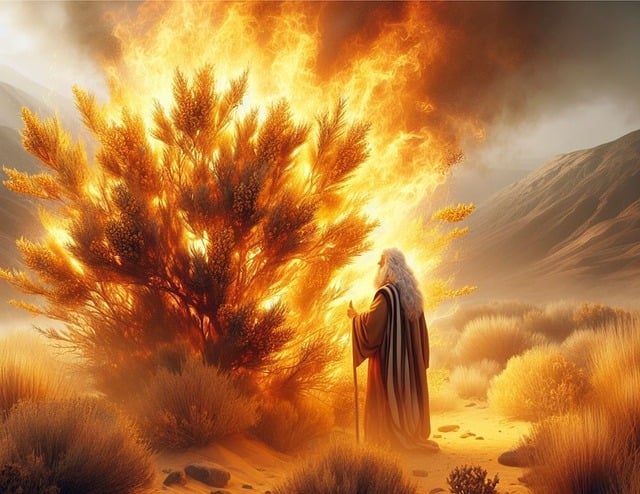Pharaoh’s kingdom was built on fear, oppression, and the subjugation of his people. From ministers and magicians to the enslaved masses, all were paralyzed by his wrath. But Moses (Musa, peace be upon him) had exposed Pharaoh’s vulnerability, shaking the foundations of his tyrannical rule. As cracks began to form in his empire of fear, Pharaoh’s paranoia grew, and his court of sycophants pushed him to ever greater acts of cruelty.
Determined to maintain his iron grip on Egypt, Pharaoh’s officers spread false rumors that Moses had conspired with magicians to win the divine contest. The magicians who had publicly submitted to God were executed, their bodies displayed to intimidate the populace. The children of Israel, already suffering under brutal slavery, were scapegoated further. They turned to Moses, lamenting that his mission had only worsened their plight. Moses counseled patience, even as he witnessed their torment.
The Betrayal of Korah
Among the children of Israel was a wealthy man named Korah (Qarun). Blessed with immense riches, Korah turned his back on God and the suffering of his people. When Moses reminded him of his duty to share his wealth through charity, Korah dismissed it as a ploy for Moses to enrich himself. His arrogance and greed led him to spread slander against Moses. But God’s justice was swift: the earth opened and swallowed Korah along with his ill-gotten gains, erasing him from history.
“Indeed, Korah was of the people of Moses, but he oppressed them. We gave him treasures whose keys would burden a band of strong men… He said, ‘I was only given it because of knowledge I have.’ Did he not know that God had destroyed before him generations greater than him in power and wealth?” (Quran 28:76-82)
A Believer Among Pharaoh’s Circle
Pharaoh’s court was filled with officials who supported his every whim, except one. This man, a relative of Pharaoh, had secretly embraced the belief in the Oneness of God. When Pharaoh sought to execute Moses, this believer courageously spoke out, warning of the consequences of defying God.
“And a believing man from Pharaoh’s family, who concealed his faith, said, ‘Would you kill a man [Moses] who says, “My Lord is God” while he has brought you clear proofs from your Lord? If he is lying, his lie will be upon him; but if he is truthful, there will strike you some of what he promises. Indeed, God does not guide one who is a transgressor and a liar.'” (Quran 40:28)
Despite his eloquent plea, Pharaoh and his advisors dismissed the warning. They threatened to kill the believer, but God protected him, saving him from their schemes.
The Signs of God’s Wrath
God commanded Moses to warn Pharaoh of severe consequences if he refused to release the children of Israel. Pharaoh, however, continued his defiance, proclaiming himself the supreme lord of Egypt and ridiculing Moses as a powerless slave. Yet, Moses’ strength came from God, and the signs of divine displeasure began to descend upon Egypt.

The first affliction was a devastating drought. Even the fertile lands of the Nile Valley turned barren, and the people of Egypt suffered immensely. Pharaoh and his ministers pleaded with Moses to ask God for relief, promising to free the Israelites. But when the drought ended, Pharaoh broke his promise. This pattern repeated as God sent successive plagues: swarms of locusts devoured crops, lice spread disease, and frogs invaded homes, causing widespread panic. Each time, the Egyptians begged Moses for help, only to return to their stubborn ways once the calamities subsided.
The final sign was the transformation of the Nile’s water into blood. For the children of Israel, the water remained pure and drinkable, but for the Egyptians, it became thick and red, symbolizing the weight of their sins. Even this most devastating sign failed to soften Pharaoh’s heart.
“And We certainly seized the people of Pharaoh with years of famine and a deficiency in fruits that perhaps they would be reminded. But when good came to them, they said, ‘This is ours [by right].’ And if a bad condition struck them, they ascribed it to evil omens associated with Moses and those with him. Unquestionably, their fortune is with God, but most of them do not know.” (Quran 7:130-131)
The Final Punishment
Pharaoh’s persistent arrogance sealed his fate. Despite repeated warnings and signs, he refused to release the children of Israel. God’s retribution was swift and decisive. The Egyptians faced calamities of increasing severity until finally, Pharaoh and his army were drowned in the Red Sea while pursuing Moses and his people.
“So We took retribution from them, and We drowned them in the sea because they denied Our signs and were heedless of them.” (Quran 7:136)
Lessons from the Story of Moses
The story of Moses and Pharaoh is a timeless testament to God’s unmatched power and justice. It highlights the dangers of arrogance, the consequences of tyranny, and the importance of patience and trust in God during adversity. For believers, it serves as a reminder that no force on earth can stand against the will of the Almighty.



